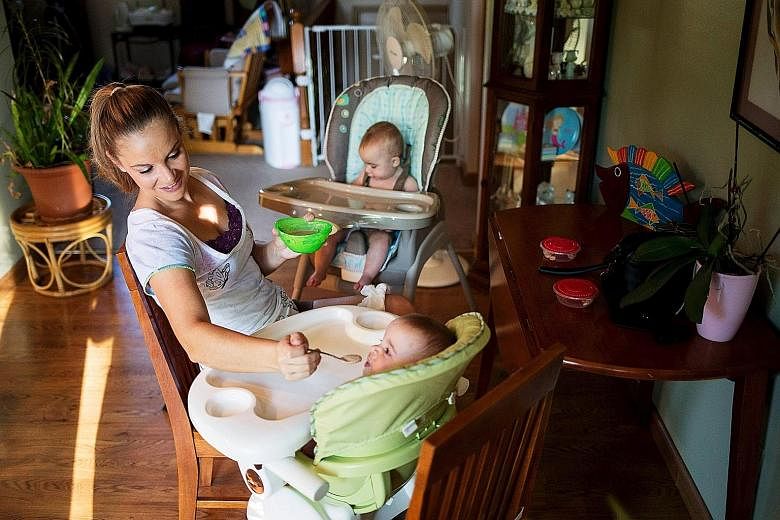The female employment rate in Japan has overtaken that of the United States, causing concern about how limited support for working mothers is keeping them from returning to the US workforce - which could, in turn, impair economic recovery.
Last year, the female employment rate in Japan for those aged 25 to 54 was 71.6 per cent, compared with just 69.9 per cent in the US, according to the Organisation for Economic Co-operation and Development (OECD).
There is no law in the US that guarantees the right to paid family leave even as the cost of childcare continues to rise. For the first time, the issue has become a hot topic among presidential candidates, with former secretary of state Hillary Clinton making paid family leave a major plank of her campaign.
"We can design a system and pay for it that does not put the burden on small business," she said during the presidential debate earlier this month, changing her tone from June last year when she said it was not "politically feasible".
Many say the unprecedented move by President Barack Obama calling for paid family leave during his State of the Union Address in January was instrumental in raising the profile of the issue. According to the US Labour Department, just 12 per cent of private-sector workers and 16 per cent at state and local governments had access to any paid family leave last year.
There are only three US states where workers can get guaranteed paid family leave: up to six weeks in California and New Jersey and four weeks in Rhode Island. But others are starting to look into the matter, including the District of Columbia.
Ms Jessica Burroughs, 44, who lives in North Carolina and works in the non-profit industry, said she has never had the luxury of paid family leave. For each of her two children - now seven and nine years old - she had to take 12 weeks of unpaid leave.
Generally, workers in the US rely on the Family and Medical Leave Act, which grants up to 12 weeks of unpaid leave a year for those in full-time jobs and in companies with 50 or more workers.
"The time-off was important to me, but it was also the first time we went into credit card debt," said Ms Burroughs. "It took me a good two years to pay that off."
The US is one of three countries - Papua New Guinea and Suriname are the other two - which do not have a paid family leave law at a federal level.
Said Ms Ariane Hegewisch, a study director at think-tank Institute for Women's Policy Research: "The research is very clear, if people have parental leave and their job is protected, they do come back to work and there is higher wage growth."
Also, according to a recent UN Women report, a rise in the number of women in the labour force has been shown to result in faster economic growth.
In Japan, data from this year shows that its female employment rate rose slightly to 72.7 per cent in February, more than two percentage points higher than the 70.3 per cent in the US. Japan has historically lagged behind the US in this respect since the mid-1970s, according to OECD data.
Experts say the shift is due to a confluence of factors, including Japan's policy changes to get mothers back into the workforce.
Prime Minister Shinzo Abe hopes to raise the percentage of women returning to work after their first child from 38 per cent in 2010 to 55 per cent by 2020.
Ms Kristin Rowe-Finkbeiner, chief executive of Moms Rising, an organisation that aims to increase families' economic security, said momentum on the issue of paid family leave is growing in the US.
"Successful entities are realising this is not just the right thing to do, but the smart thing to do for their bottom line," she said.
But even though Democratic presidential candidates have thrown their weight behind the issue, Ms Hegewisch says nationwide change will take time. "There is a huge lobby against federal spending holding things back... The strategy really is to encourage more states to look at the issue and how it can be done so that eventually, it will percolate up to the federal level."

